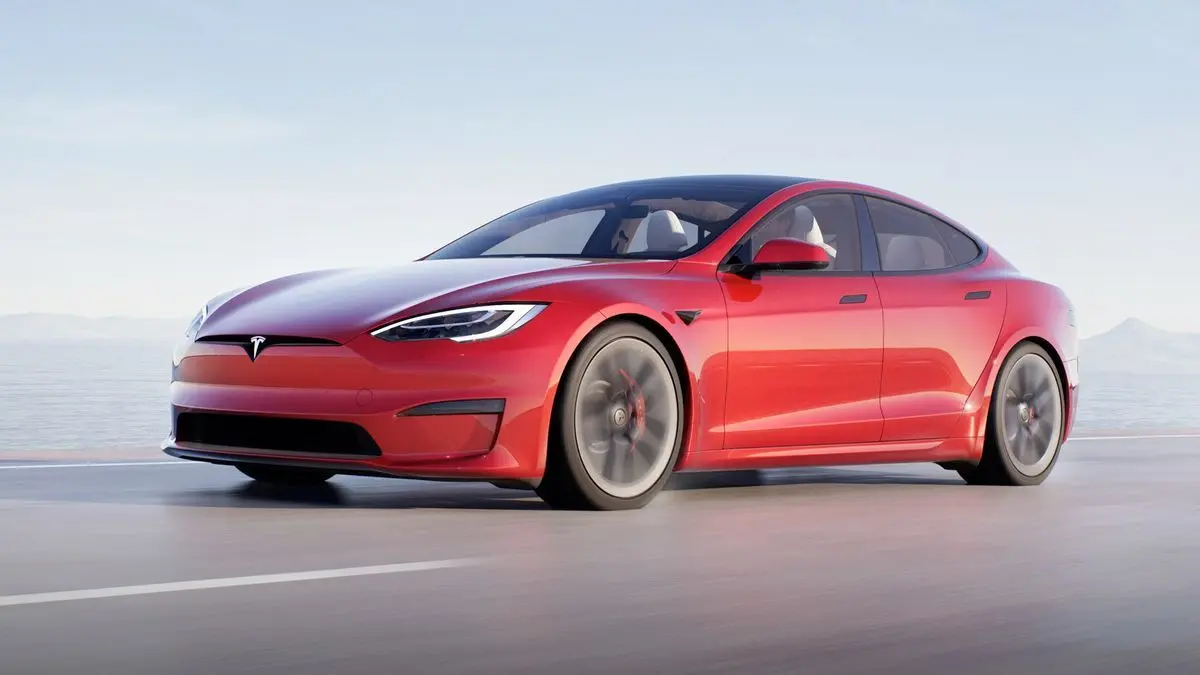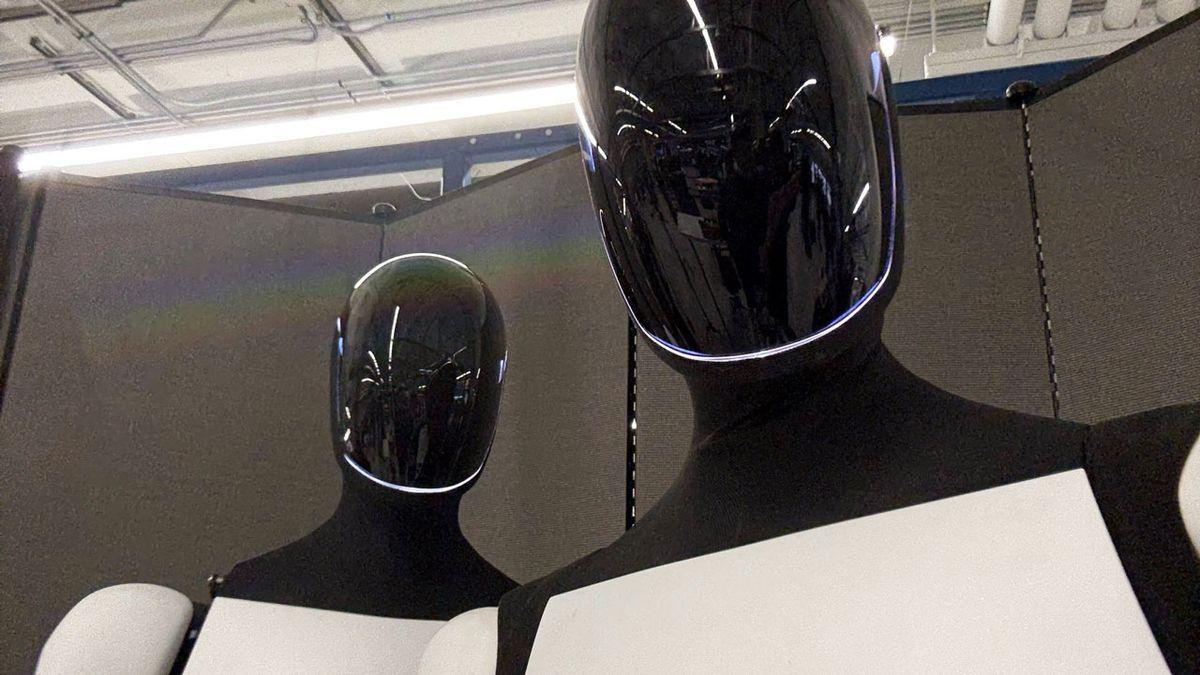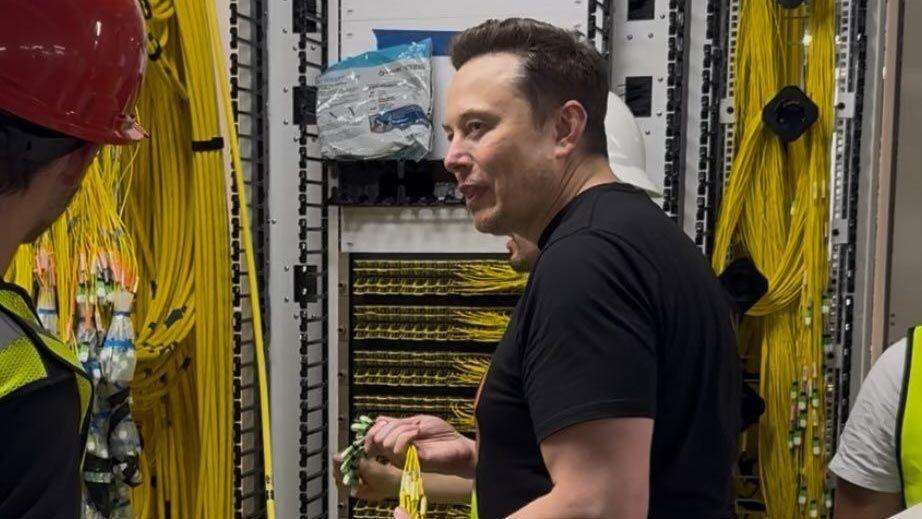Tesla Unveils AI5 Chip: A Game-Changer in Performance and Manufacturing Strategy
3 Sources
3 Sources
[1]
Elon Musk says Tesla 'not about to replace Nvidia' as EV maker develops chips for cars, robots
Tesla CEO Elon Musk listens as U.S. President Donald Trump speaks to reporters in the Oval Office of the White House on May 30, 2025 in Washington, DC. Tesla's forthcoming artificial intelligence chip that it's calling the AI5 will be manufactured by Samsung in Texas as well as by TSMC in Arizona, CEO Elon Musk told investors on Wednesday. On the electric vehicle maker's third-quarter earnings call, Musk said Tesla is shooting for "excess production," and that any chips not used in cars or robots can be used in his company's data centers. "Our explicit goal is to have an oversupply of AI5 chips," Musk said. Tesla formerly used Nvidia's Drive chips in its vehicles, but dropped them in favor of its own processors in 2019. Musk said that Tesla will continue to use Nvidia's graphics processing units, which dominate the AI market, for training its models. "We're not about to replace Nvidia, to be clear, but we do use both in combination," Musk said. Tesla announced on Wednesday that it has computing capacity equivalent to 81,000 of Nvidia's H100 chips. Musk's comments offer a fresh glimpse into Tesla's AI chip strategy after ex-Apple engineer Peter Bannon left the company earlier this year. Bannon previously helmed chip design for Tesla and was leading the development of Dojo, a supercomputer meant to help the company improve its driverless technology. The AI5 chip was first announced in 2024 at Tesla's shareholder meeting. It's the latest version of the car company's Autopilot hardware that processes signals needed for self-driving features. In July, Samsung announced that it had secured a $16.5 billion chip contract with an unnamed client -- Musk later confirmed it was Tesla. Musk said at the time that the AI5 chip would be made by TSMC and that its successor, the AI6 chip, would be made by Samsung. On Wednesday, he said the AI5 chip would be made by both foundries at their U.S. facilities. He said it would fit on a "half reticle," meaning the chip is half the size of "full reticle" AI chip designs from Nvidia and Advanced Micro Devices.
[2]
Tesla's new AI5 chip promises 40x the performance of its predecessor
Tesla plans to use excess AI5 chips in its data centers alongside existing Nvidia hardware. Tesla announced its next-generation AI5 chip during its third-quarter 2025 earnings call, detailing a component with up to 40 times the performance of its predecessor. The chip will be manufactured by both Samsung and TSMC in their U.S. facilities. The AI5 chip, which was first shown at the company's 2024 shareholder meeting, was described by CEO Elon Musk on the earnings call as "an amazing design." He explained that the performance increase is a direct result of the company's deep integration of hardware and software. "By some metrics, the AI5 chip will be 40x better than the AI4 chip," Musk stated, attributing the improvement to the chip's custom optimization for Tesla's specific applications across its product lines. The new architecture delivers significant upgrades over the AI4, including eight times more raw compute power, nine times more memory, and five times higher memory bandwidth. Tesla engineers achieved the 40-fold performance gain by re-architecting processes that created bottlenecks in the previous design. A key example is the handling of SoftMax operations, which required 40 emulation steps on the AI4 but will now run natively in only a few steps on the AI5. The chip also incorporates native support for mixed-precision models and sparse tensor operations, which are tailored to handle real-world artificial intelligence workloads more efficiently. Tesla's manufacturing strategy for the AI5 involves a dual-foundry approach, a shift from earlier plans. The original roadmap had designated TSMC as the sole producer for AI5, with Samsung slated to manufacture the future AI6 chip. By engaging both Samsung and TSMC for AI5 production, Tesla aims to build supply chain resilience. "Our explicit goal is to have an oversupply of AI5 chips," Musk said. He elaborated that any chips not installed in vehicles or the company's Optimus robot will be repurposed to expand Tesla's data center operations. This internal chip development supplements, but does not replace, the company's existing hardware partnerships. Musk clarified that Tesla does not have plans to replace Nvidia as a hardware provider for its data centers. Instead, Tesla will use its AI5 chips "in conjunction with" Nvidia's systems to augment its computational capacity. Currently, Tesla's data centers operate with computing power equivalent to 81,000 Nvidia H100 chips. The design of the AI5 chip eliminates legacy components, such as traditional GPUs and image signal processors. Musk explained that this streamlined design means the AI5 effectively becomes "a GPU" itself. He predicted this new architecture will result in the industry's "best performance per watt, maybe by a factor of two or three, and the best performance per dollar for AI, maybe by a factor of 10."
[3]
Tesla unveils new AI5 chip, to be produced by Samsung and TSMC
Tesla aims for higher performance per dollar with the AI5 by tailoring it specifically to the company's needs, potentially achieving tenfold performance increases compared to other AI chips. , CEO of , revealed details about the company's next artificial intelligence chip, the AI5, during the Q3 earnings call on Wednesday. The AI5 will be produced by both Samsung in and TSMC in , aiming for "overproduction" to satisfy Tesla's needs in cars, robots, and data centers. continues to use Nvidia GPUs Despite developing its own chips, will continue to use Nvidia's graphic processing units for model training due to their dominance in the AI market. Musk stated that wants to use both technologies together rather than fully replacing Nvidia. Musk also pointed to Tesla's substantial computing capacity, equivalent to 81,000 Nvidia H100 chips, highlighting the company's commitment to enhancing its AI capabilities. The announcement follows the departure of former Apple engineer , who previously led Tesla's chip design and the development of the Dojo supercomputer designed to improve driverless technology. AI5 chip The AI5 chip, first announced in 2024, is the latest iteration of Tesla's Autopilot hardware responsible for processing the signals necessary for autonomous driving. Earlier this year, Samsung closed a chip deal with , confirming Musk's statement that the AI5 would be produced by TSMC and its successor, the AI6, by Samsung. Musk further clarified that both foundries would produce the AI5 at their US facilities, noting its smaller size compared to the "full reticle" designs of Nvidia and AMD. Hyperscaler trend to develop custom AI chips Tesla's decision to design its own chips follows a trend among hyperscalers such as Google, Amazon, and Microsoft, who are developing custom AI chips for cost efficiency and performance optimization. Musk emphasized the advantage for of being the sole customer for the AI5, allowing designers to tailor it specifically to the company's needs and eliminate unnecessary components, potentially leading to superior performance per dollar. He predicted that the AI5 could be up to ten times more powerful than other artificial intelligence chips. Musk acknowledged Nvidia's success in meeting complex demands but expressed Tesla's ambition for "radical simplicity" in chip design. Musk's AI startup xAI, which collaborates with , has become a major Nvidia customer. Follow Business AM on as well Want access to all articles? Take advantage of our summer promo and subscribe here!
Share
Share
Copy Link
Tesla announces its next-generation AI5 chip, promising significant performance improvements and a dual-foundry manufacturing approach. The chip will be used in Tesla's vehicles, robots, and data centers, complementing existing Nvidia hardware.
Tesla Unveils Next-Generation AI5 Chip
Tesla, the electric vehicle giant, has announced its latest artificial intelligence chip, the AI5, during its third-quarter 2025 earnings call. CEO Elon Musk revealed that the new chip promises significant performance improvements and will be manufactured by both Samsung and TSMC in their U.S. facilities
1
2
.Performance Leap and Design Innovations
The AI5 chip boasts impressive performance gains over its predecessor, the AI4. Musk claimed that 'by some metrics, the AI5 chip will be 40x better than the AI4 chip'
2
. This substantial improvement is attributed to Tesla's deep integration of hardware and software, resulting in custom optimization for the company's specific applications across its product lines.Key upgrades include eight times more raw compute power, nine times more memory, and five times higher memory bandwidth. The chip's architecture has been redesigned to eliminate bottlenecks, with native support for mixed-precision models and sparse tensor operations
2
.Dual-Foundry Manufacturing Strategy
In a strategic shift, Tesla has opted for a dual-foundry approach for the AI5 chip. Both Samsung in Texas and TSMC in Arizona will manufacture the chip, a change from the original plan that designated TSMC as the sole producer
1
3
. This decision aims to build supply chain resilience and ensure an oversupply of AI5 chips.Related Stories
Complementing Nvidia, Not Replacing
Despite developing its own chips, Tesla will continue to use Nvidia's graphics processing units (GPUs) for model training. Musk emphasized that Tesla is not aiming to replace Nvidia but rather to use both technologies in combination
1
. Tesla's current computing capacity is equivalent to 81,000 Nvidia H100 chips, highlighting the company's significant AI capabilities.Applications and Future Prospects
The AI5 chip will be used in Tesla's vehicles, robots, and data centers. Any excess chips not used in cars or robots will be repurposed to expand Tesla's data center operations
2
. Musk predicts that the AI5 will offer the 'best performance per watt, maybe by a factor of two or three, and the best performance per dollar for AI, maybe by a factor of 10'3
.This development aligns with a broader trend among tech giants to develop custom AI chips for cost efficiency and performance optimization. Tesla's approach of being the sole customer for the AI5 allows for tailored design and potentially superior performance per dollar compared to other AI chips in the market.
References
Summarized by
Navi
[1]
[3]
Related Stories
Tesla Partners with Samsung for AI5 Chip Production as Musk Claims Korean Fab Outperforms TSMC's Arizona Facility
23 Oct 2025•Business and Economy

Elon Musk Announces Ambitious Plan to Outproduce All AI Chip Makers Combined with Tesla's Custom Silicon
25 Nov 2025•Technology

Tesla restarts Dojo3 supercomputer project, pivots to space-based AI compute infrastructure
19 Jan 2026•Technology

Recent Highlights
1
ByteDance's Seedance 2.0 AI video generator triggers copyright infringement battle with Hollywood
Policy and Regulation

2
Demis Hassabis predicts AGI in 5-8 years, sees new golden era transforming medicine and science
Technology

3
Nvidia and Meta forge massive chip deal as computing power demands reshape AI infrastructure
Technology





